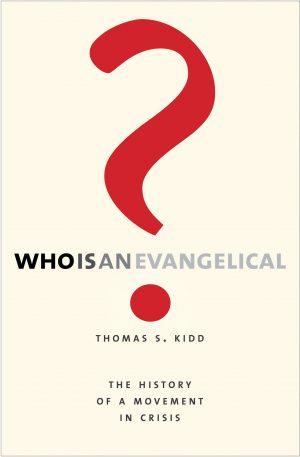The word evangelical comes down to us via Latin from the Greek word εὐαγγέλιον, meaning “good news.” In the Reformation Era, it described Lutherans and other Protestants who broke from the Roman Catholic Church, emphasizing the good news of justification by grace through faith. Beginning in the 18th century, however, it came to describe a particular movement within Anglophone, trans-Atlantic Protestantism, which Thomas S. Kidd calls “the religion of the born again.” He traces the history of that movement in his new book, Who Is an Evangelical?
Kidd is the James Vardaman Distinguished Professor of History at Baylor University and a scholar of the era of the American founding. He is author of numerous books, including The Great Awakening; biographies of Patrick Henry, George Whitefield, and Benjamin Franklin; and the forthcoming America’s Religious History. In Who Is an Evangelical? he aims to “introduce readers to evangelicals’ experiences, practices, and beliefs, and to examine the reasons for our crisis today.” More on that crisis in a moment.
Evangelicals, as Kidd defines the term, are “born-again Protestants who cherish the Bible as the Word of God and who emphasize a personal relationship with Jesus Christ through the Holy Spirit.” These three markers — “conversion, Bible, and divine presence” — make evangelicalism a loosely defined movement rather than a tightly defined denomination or theological school. Understood this way, evangelicalism has always been international, multiethnic, and transdenominational.
(Side note: I am an ordained Assemblies of God minister and executive editor of the denomination’s Influence magazine. The AG is a classical Pentecostal denomination whose distinctive doctrine is baptism in the Holy Spirit evidenced by speaking in tongues. Though this doctrine distinguishes the AG from other evangelicals, there is no doubt that the AG specifically, and Pentecostals generally, are evangelicals. Indeed, the Assemblies of God was a founding member of, and is the largest denomination within, the National Association of Evangelicals.)
Today, unfortunately, the term evangelical serves as “an ethnic, cultural, and political designation rather than a theological or devotional one,” according to Kidd. For example, you undoubtedly have heard that 81 percent of evangelical voters in the 2016 presidential election cast their ballots for Donald Trump. Pollsters identified “evangelicals” with “white religious Republicans.” This identification was problematic for at least two reasons:
- Non-white voters were not classified as evangelicals even if their theology and spirituality matched traditional markers of evangelicalism — e.g., conversion, Bible, and divine presence.
- White voters who self-identified as “evangelicals” retained the identification even if their theology and spirituality didn’t match those traditional markers.
This “politicization” of evangelicalism is a crisis for the health of the movement long term. It trades the traditional emphasis on conversion, Bible, and divine presence for an emphasis on partisan politics, leaving in its wake “the widespread perception that the movement is primarily about obtaining power within the Republican Party.” In the process, it overlooks the tremendous growth of evangelical forms of Christianity among the very racial and ethnic minorities — black, Hispanic, Asian — who represent a rising tide in America’s demographic sea. At the very moment when America’s Christians need to speak with a united voice across a wide range of social and ethical issues, politicization makes it harder for us to do so. United by faith, evangelicals are divided by politics.
Kidd’s brief survey of evangelical history shows that “the tension between the spiritual and political goals of evangelicals has existed since the 1740s,” the era of the Great Awakening, when George Whitefield, Jonathan Edwards, and John Wesley were leading Anglophone evangelicalism. Politics, in a sense, cannot be avoided, since our nation — any nation, for that matter — must decide what its public policies are. But politicization, the reduction of the gospel to policy and of Christianity to party, both can and should be avoided, lest the good news be tarnished by the lust for earthly power.
“Partisan commitments have come and gone,” Kidd concludes. “Sometimes evangelicals have made terrible political mistakes,” mistakes that he documents in his book, though the mistakes are leavened somewhat by evangelical successes. “But conversion, devotion to an infallible Bible, and God’s discernible presence are what make an evangelical an evangelical.”
Whether the term evangelical can be rehabilitated to shed its racial, ethnic, and partisan connotations is an open question. If that question is to be answered affirmatively, however, it will likely be along the lines Kidd sketches in this historical introduction to the religion of the born-again, which I fervently hope will be born again.
Book Reviewed
Thomas S. Kidd, Who is an Evangelical? The History of a Movement in Crisis (New Haven, CT: Yale University Press, 2019).
P.S. If you liked my review, please click “Helpful” on my Amazon review page.
P.P.S. This review first appeared at InfluenceMagazine.com and is posted here with permission.

